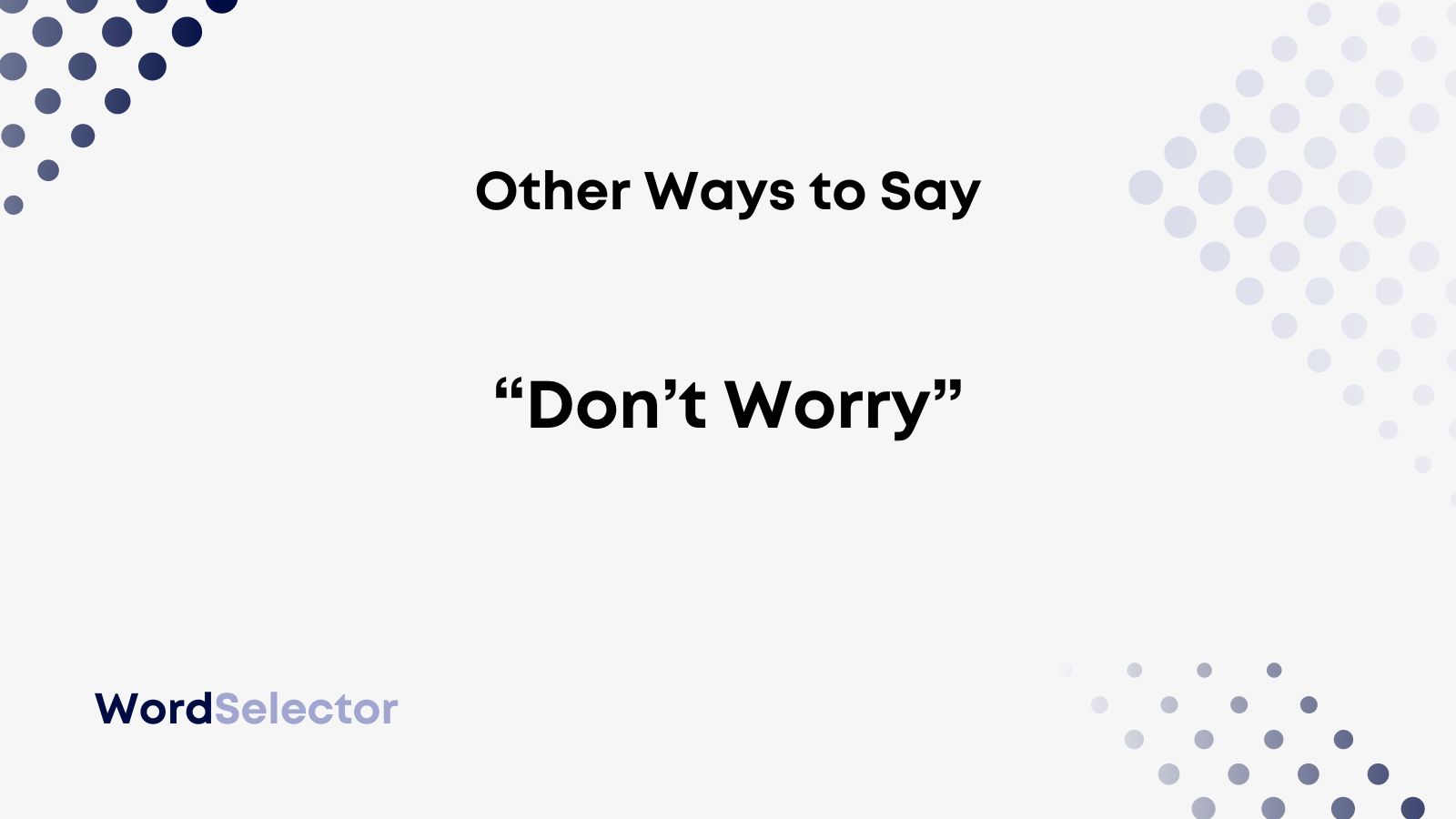Is it appropriate to say “don’t worry” to quell someone’s concerns? Or does this phrase come across as dismissive and rude?
We’re here to answer that question. Moreover, we’ve compiled a list of alternative phrases to “don’t worry” so you’re never left tongue-tied!
Other Ways to Say “Don’t Worry”
- The situation is under control
- Don’t trouble yourself
- Rest assured
- Don’t concern yourself
- Don’t panic
- Compose yourself
- It’s nothing to be concerned about
- Take it easy
- Relax
- It’s all good
- Calm down
- Calm yourself
- Fret not
- Worry not
- Have no fear
- Stay cool
- Chill out
- Never mind
- Don’t mention it
- Stay calm
- That’s okay
- Cool it
- Chin up
- Don’t sweat it
- It’s going to be okay
- No use crying over spilled milk
- No worries
- Hakuna Matata
- No harm done
- These things happen
KEY TAKEAWAYS
- Saying “don’t worry” is not considered rude unless you say it with a rude tone of voice, or in an inappropriate context.
- In formal circumstances, you can say “the situation is under control” instead.
- In informal circumstances, you can change up your phrasing by saying “don’t trouble yourself.”
Don’t click away! We still need to discuss our choice of formal and informal synonyms for “don’t worry” in detail.
After that, we’ll discuss the situations where saying “don’t worry” might come across as rude.
The Situation Is Under Control (Formal)
If you’re seeking a professional way to say “don’t worry,” we suggest “the situation is under control” as a formal alternative.
Firstly, this phrase works well to quell any concerns a client or employer may have about a problem. It also makes you sound confident and competent when it comes to your ability to take charge.
Secondly, using this phrase is a great way to show leadership skills in the workplace. Because not only are you saying there is no need to worry, but you are also showing that you are taking control of the issue.
This phrase is certainly better to use than “don’t worry” in problematic circumstances. After all, it doesn’t help to tell someone to manage their emotions about a problem if that problem persists!
Consider the following email example:
Dear Sir,
I wanted to let you know that there has been a delay with the Edmund trust due to a dispute with the deceased’s spouse.
However, the situation is under control, as I have already reached an agreement with her representatives on the matter.
Yours sincerely,
Sindiso
Don’t Trouble Yourself (Informal)
Another alternative to the phrase “don’t worry” is “don’t trouble yourself.”
This a polite way to let someone know that you don’t need help with something or that they simply shouldn’t worry.
It’s not an especially formal phrase, so we wouldn’t recommend using it in response to your superior or a client, for instance. However, you can certainly use it when speaking to colleagues, especially if you have a friendly dynamic in the office.
“Don’t worry” is an equally effective phrase, but it never hurts to shake up your language from time to time!
Let’s see this phrase used in a couple of examples:
Person 1: Can I help you with anything?
Person 2: Oh, please don’t trouble yourself, I can manage.
Don’t trouble yourself; it takes time to learn all these skills.
Is It Rude to Say “Don’t Worry”?
It is never inherently rude to say “don’t worry.” However, like anything, the tone of voice you use and the context in which you use it can make all the difference!
You can use this phrase in response to someone apologizing, or if you see that someone is visibly stressed about something. It should usually be a way to assuage someone’s stress, for example:
- Don’t worry about it
- Don’t worry about me
However, it could be rude to tell someone not to worry if the tone you use invalidates their feelings about something serious or important to them, for example:
- Don’t worry about a career – a good-looking girl like you can always find a nice husband to make the money!
So, be sure to listen first and show empathy before responding!
It’s also possible to use this phrase in a passive-aggressive manner, like in the following example:
- Don’t worry, I’ll just do everything, as usual.
In conclusion, saying “don’t worry” isn’t generally considered rude, unless the context or the tone you use makes it that way!
If you find this article helpful and think you could make use of our list of alternatives, feel free to bookmark this page for later!

